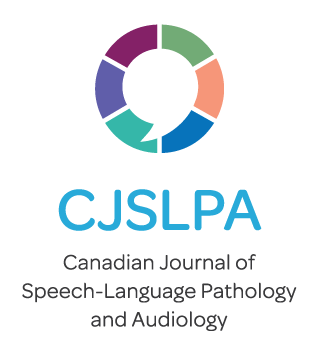

| Author(s) |
Phyllis Schneider, PhD Barbara Williams, MsC Maya Hickmann, PhD |
| Volume | 21 |
| Number | 1 |
| Year | 1997 |
| Page(s) | 8-16 |
| Language | English |
| Category | |
| Keywords |
metalingustic awareness narrative cohesion language |
| Abstract |
This study investigated the metalinguistic abilities of school-aged children with and without language/learning disabilities, specifically their reactions to anomalies in referential cohesion resulting from inadequate referent introduction in three tasks: retelling stories, repeating individual sentences of stories, and judging the adequacy of stories. Although children in the language/learning disabilities group exhibited some metalinguistic awareness of referential cohesion, fewer explicitly objected to the use of definite determiners for referent introduction in comparison to children with no disabilities. Such a difference in awareness might account for differences in referential cohesion previously reported in the literature. However, the fact that some children in the language/learning disabilities group detected inadequate pronominal referent introductions suggests that they are in process of developing metalinguistic awareness of discourse cohesion. Dans cette étude, on a étudié les compétences métalinguistiques d'enfants d'âge scolaire atteints ou non de troubles du langage ou d'apprentissage, en particulier leurs réactions à des anomalies de cohérence référentielle attribuables à l'introduction inappropriée de référents dans trois tâches : répéter des histoires, répéter des phrases isolées dans des histoires et juger de la pertinence des histoires. Bien que les enfants du groupe ayant des troubles du langage ou d'apprentissage aient manifesté une certaine conscience métalinguistique de la cohérence référentielle, peu d'entre eux s'opposaient à l'utilisation de facteurs déterminants précis pour introduire des référents par comparaison avec les enfants n'ayant aucun trouble. Cette différence en matière de conscience pourrait correspondre aux différences à l'égard de la cohérence référentielle précédemment signalées dans la littérature. Le fait que certains enfants du groupe ayant des troubles du langage ou de l'apprentissage aient décelé des introductions inappropriées de référents pronominaux laisse toutefois présager qu'ils sont en train d'acquérir une conscience métalinguistique de la cohérence du discours. |
| Record ID | 151 |
| Link | https://cjslpa.ca/files/1997_JSLPA_Vol_21/No_01_1-68/Schneider_Williams_Hickmann_JSLPA_1997.pdf |
CJSLPA is an open access journal which means that all articles are available on the Internet to all users immediately upon publication. Users are allowed to read, download, copy, distribute, print, search, or link to the full texts of the articles, or use them for any other lawful purpose.
CJSLPA does not charge authors publication or processing fees.
Copyright of the Canadian Journal of Speech-Language Pathology and Audiology is held by Speech-Language and Audiology Canada (SAC). Appropriate credit must be given (SAC, publication name, article title, volume number, issue number and page number[s]) but not in any way that suggests SAC endorses you or your use of the work. You may not use this work for commercial purposes. You may not alter, transform, or build upon this work.